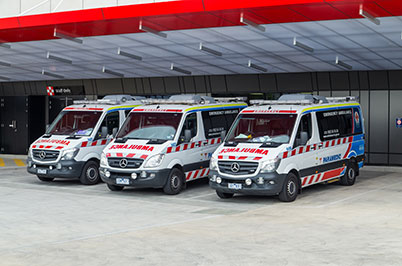Guide to Calling the Emergency Services
December 16th, 2014

Calling emergency services is something that we will hopefully not have to do too often. However it is something that we should all know how to do, should the need ever arise. Knowing the ins and outs of calling emergency services can be hard to determine without actually going through with a call. For that reason, we look at what to expect when calling emergency services and what your options are when you need help.
What to dial
To some, it may be obvious. For those who don’t know, 000 is the number to call if you require emergency services. Emergency services should only be dialled if you are in a situation that could be life-threatening. This includes criminal matters, fires, as well as medical emergencies. A medical emergency includes, but is not limited to, loss of consciousness, breathing difficulties, major uncontrolled bleeding, convulsions and fits, stroke, drug overdose, and allergic reaction. There are a multitude of reasons a person may be experiencing a medical emergency. If you think it may be an emergency, call 000 and the paramedics will assess the situation when they get to you.
112 is an international standard emergency number that can be dialled from mobile phones. It’s important to note that dialling 112 from a landline will not redirect to emergency services, so the 000 number must always be used from landlines. 112 can be dialled from mobile phones without entering a PIN or sim card. 112 does not give your call priority over persons calling the 000 line.
911 is a phone number for emergency services in countries such as the United States and Canada. Dialling it in Australia will not redirect you to the 000 emergency services line.
If you have a police matter to report but it is not an emergency, check outstate and territory emergency services organisations as each state has its own numbers to use.
What to do
The most important thing to remember is to try and stay calm. Try to talk slowly and carefully to avoid having to repeat yourself. As hard as it may be, a calm, clear voice will help you to get the attention you need faster.
- When you first call 000, you will be directed through to an operator who will ask you what service you need. You should then respond with either ambulance, police, or fire brigade. The operator will then direct you to the appropriate service.
- From there, details such as your phone number and address will be recorded. The next operator will enquire about the nature of the emergency and what is happening. They will advise you on what to do if the situation requires immediate assistance.
- While you are answering questions on the situation, the operator will relay this information to the services you require, and ask them to dispatch. You will not hear this happening, but it will be happening in the background of your call.
- Ensure that you wait until the operator tells you to hang up from the call. Do not hang up until they have told you it is okay. This is to make sure that they have all of the information they need.
- If possible, have someone waiting outside to wave down the service that is on their way to you. If this is not possible, try and have a light on at the front of the house. If you are required to give medical attention while you are waiting for the services to arrive, continue to do so.
Other options for deaf and hard of hearing persons
For those who use TeleTYpewriter (TTY) phones, you would need to contact emergency services by dialling 106. It is available 24 hours a day, seven days a week through the TTY service, and is a free number. When calling, you will be asked if you require the police (type PPP), ambulance (type AAA), or fire services (type FFF). Speak and Read users just need to say the service they require. Because TTY is linked to a fixed line, the address will not need to be given to the operator. 106 is only available from a TTY phone and is not available through a normal telephone, mobile phone, or SMS.
Those who are deaf or hard of hearing can access emergency services through internet relay, captioned relay, SMS relay, and video relay through the National Relay Service.
If you make a call to 000 and cannot talk for any reason, the operator will ask you to dial 55. The police will either try to call you or send a patrol car to your location to make sure everything is alright. If you do not dial 55 when directed, the call will be terminated. This is to stop any false alarm calls in situations such as an unlocked mobile phone.
